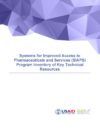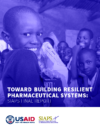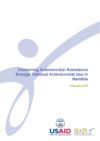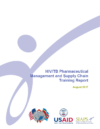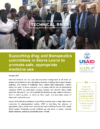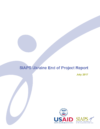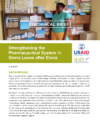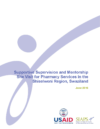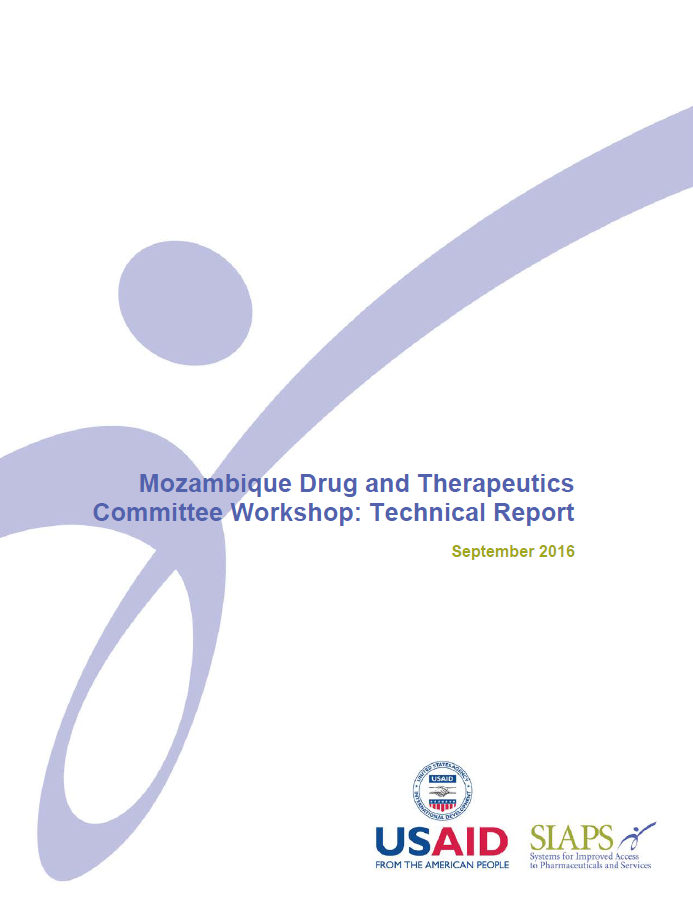The main purpose of this inventory is to serve as a reference to help stakeholders working in the pharmaceutical sector easily access and use already available SIAPS resources, including tools, experiences, and results. The document is also intended to serve as a technical legacy for SIAPS to support knowledge exchange and sustainability of related work. … Read more
AMR, Antimicrobial Resistance, Drug and Therapeutics Committee, essential medicines list, HIV/AIDS, Malaria., neglected tropical disease, pharmaceutical financing, pharmaceutical services, rational medicine use, RMNCH, standard treatment guidelines, Supply chain management, tuberculosis
SIAPS final report showcases achievements across 46 countries. Interventions are described by intermediate results and health areas and demonstrate how SIAPS successfully worked with a range of stakeholders, including Ministries of Health, to bolster pharmaceutical systems and address country-specific needs.
The SIAPS-developed AMR coalition-based strategy identifies educational institutions, such as UNAM; therapeutic committees (TCs); and key institutions involved in AMR, such as the National Institute of Pathology (NIP) as key players in the pre- and in-service training of health care professionals to enhance RMU and combat AMR. SIAPS collaborated with key institutions, including the MoHSS, … Read more
According to the World Health Organization, many countries spend 30–40% of their health care budgets on medicines and medical commodities, and a significant amount of the funds are wasted because of irrational medicines use and inefficiencies in stock management due to lack of skills. Other serious problems that health care organizations face include the overuse … Read more
SIAPS Final Report showcases achievements across 46 countries. Interventions are described by intermediate results and health areas and demonstrate how SIAPS successfully worked with a range of stakeholders, including Ministries of Health, to bolster pharmaceutical systems and address country-specific needs. [button style=”download” link=”https://siapsprogram.org/wp-content/uploads/2018/03/SIAPS-End-of-Program-Report.pdf” color=”silver”]Download this file as a PDF[/button]
Irrational medicine use and poor pharmaceutical management at all levels are widespread problems in many developing countries, including Sierra Leone. Misuse, underuse, and overuse of medicines; weak systems that compromise medicine safety; the waste of scarce resources due to expiry; and the rise of antimicrobial resistance (AMR) are particularly worrying because they directly affect health … Read more
The availability of a unified essential medicines list (EML) with evidence-based clinical efficacy to be used by the Ministry of Health (MOH) for the state-guaranteed package of services is an essential part of the successful launch of the health care reform initiative in Ukraine. This required the development and institutionalization of a process to ensure … Read more
SIAPS received two years of funding from the U.S. Agency for International Development (USAID) in September 2015 to provide technical assistance to rebuild and strengthen the post-Ebola pharmaceutical supply chain management system and improve the supply chain and rational medicine use in Sierra Leone. To support these goals, SIAPS provides technical assistance for systems strengthening activities … Read more
With support from SIAPS and in collaboration with other development partners, the Central Medical Stores (CMS) conducts supportive supervision and mentorship (SSM) visits to health facilities. Through these visits, the capacity of health personnel is built to effectively manage pharmaceuticals and services, improve the rational use of pharmaceuticals, and strengthen supply chain management at all levels … Read more
Inefficient and irrational use of medicines is a well-documented problem in both developed and developing countries. It leads to cost increases and adverse clinical effects for patients. The inappropriate use of medicine can be reduced if health care professionals involved in the different aspects of medicine use promote good practices for medicine management and use. … Read more
